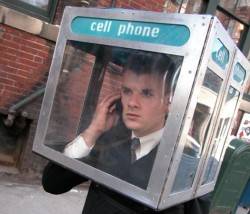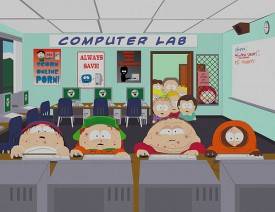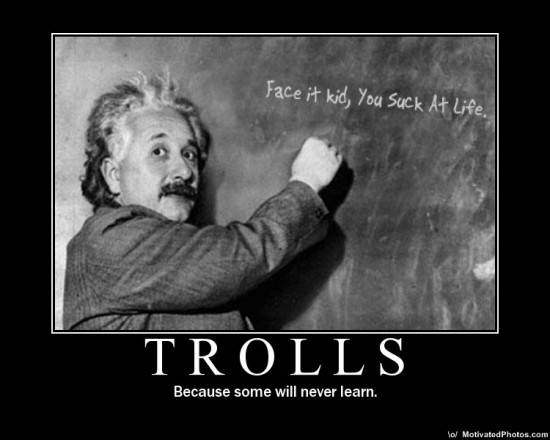From sharpened rocks to disinfectants, language to politics, bronze to carbon fiber, humankind has been using tools to help understand and better our lives for millions of years; and we now find ourselves in an amazing period of technological acceleration. But, with respect to all the benefits this bestows on us, there are an equivocal number of dangers. No, I’m not going to jump into a discussion on how our pursuit of knowledge will likely lead to our demise; instead, I’m going to talk about a few ways some common technological devices are endangering our lives, socially.
 #1. Culture is being compromised
#1. Culture is being compromised
In my experience, text is the most common way for people to communicate nowadays (text messages, tweets, Facebook posts, emails, blogs, etc), and I think that poses a problem. For example, we’re beginning to dumb down our vocabulary and intentionally spell words incorrectly in order to get information across faster:
“Yo wats up?”
“Nothing what r u doing”
“Out tonite?”
“K”
This is directly related to issues concerning fast food vs. slow food. While fast food allows us to quickly and efficiently grab meals, we’re beginning to replace a central part of life with empty carbs and even emptier culture. There was a time when eating was wholesome and sociable, but that has become rare in the U.S. today.
Another reason speaking through text is lacking is that terhe’s olny so mcuh you can say wtih 26 letetrs mdae itno snenteces, and aprapnetly it dseon’t rlleay mtater if you do taht rgiht! With traditional human contact you are able to do so much more; where do the subtle voice inflections and telling mannerisms come into play with text? Capital letters and exclamation points can only go so far. CAN YOU SEE ME POUNDING MY FISTS!!!? Well I’m not, and I never do… I‘m sitting here with a straight face, the same one I have when I write “LOL!” to that story about your cat and his crazy antics.
Not only that, but how much has our ability to write changed because of computers? While writing this article, mistakes have automatically been corrected in my grammar and vocabulary, not to mention the thesaurus that’s available to ensure that I don’t get too repetitive monotonous. Which brings up the point: who is the brains behind my writing?
#2. Our personal relationships are suffering
 I don’t mean they’re suffering with respect to the number of friends we have or how often we speak to them, but for many the substance of those relationships has become diluted. “Quality over quantity” remember? That phrase doesn’t just apply to the unpopular kid that hangs out with his stuffed animals on Friday night; today we can see the true meaning behind it. I have 558 friends on Facebook, but I really don’t “know” most of them. Some I went to high school with; others I met on U of I’s campus; and some are just friends of friends… that’s as deep as the relationship goes. Is our connection to countless people being utilized effectively? Or are we just using it to share pictures, videos, and text in order to express how much fun we have when they’re not around? I think we find comfort in online relationships, but in doing so, we miss out on the more dynamic parts of their personalities.
I don’t mean they’re suffering with respect to the number of friends we have or how often we speak to them, but for many the substance of those relationships has become diluted. “Quality over quantity” remember? That phrase doesn’t just apply to the unpopular kid that hangs out with his stuffed animals on Friday night; today we can see the true meaning behind it. I have 558 friends on Facebook, but I really don’t “know” most of them. Some I went to high school with; others I met on U of I’s campus; and some are just friends of friends… that’s as deep as the relationship goes. Is our connection to countless people being utilized effectively? Or are we just using it to share pictures, videos, and text in order to express how much fun we have when they’re not around? I think we find comfort in online relationships, but in doing so, we miss out on the more dynamic parts of their personalities.
#3. We are no longer protected by our inhibitions
There was once a time when we’d be embarrassed to facilitate the conversation of certain issues, but now that we are safe behind a computer and privacy laws, we’re no longer accountable (this could be good or bad). Want an example of what I’m talking about? Porn. Want another? A friend of mine recently informed me of a website called 4chan. Just a quick perusal of the site proves that people have discovered that they share common interests in drawings of naked humanoid raccoons, mocking the mentally and physically challenged, bestiality, rape porn, and discussions centered around how to commit murder and get away with it. For as strange and disturbing as these topics may be, I don’t believe the people posting them are crazy or disturbed. Whether it’s because people are interested in things that are “off limits” (like drinking alcohol underage ) or they just find this stuff sexually appealing, it’s facilitated by the hyper-connectivity we are beginning to experience with new information technology. People haven’t necessarily changed, but anonymity on the Internet encourages many to push the envelope, which could get out of hand.

#4. We are UNBELIEVABLY susceptible to advertising tactics (see what I did there)
If nothing else, all of this information technology has made us a new breed of consumer; and, unfortunately, the “consumer” is in actuality the one being preyed on. We are infatuated with illusions of the “easy way.” All of a sudden, we’re told to buy new cell phones and certain alcoholic beverages to fill voids in our lives. Whatever happened to promoting hard work and self confidence, be the change you want to see in the world, etc. Whether we get comfort imagining ourselves partying with large groups of people or finally feeling connected to imaginary vampires by eating fast food, the companies behind the ads are feeding off our wallets, thanks to new technology that makes it easier and cheaper to target their demographics.
Here’s an example:
In a recent phone commercial, a 21–28 year-old male is shown using his smartphone to meet his future wife and birth the 57th president of the United States. It seems harmless until you break down the intention of the ad, and that‘s important (obvious advertising is ineffective; we don‘t like being taken advantage of). Here’s the commercial in case you missed it:
Translated:
Hey mom and dad, how would you like to be the grandparents of a future president of the United States? All you have to do is purchase this phone for your son so he can meet the perfect woman and settle down to have that future Mr. President! It’s only a $20 investment (plus a $120 per month for two years activation plan)… what do you have to lose?
While changes in technology continue, it’s important to stay mindful of our choices, as insignificant as they may seem. There are consequences to all of our actions, from navigating a website to driving a car. We need to take responsibility for what we put our time and money into. For as effortless as this new technology is making our lives, there is never an “easy way” when it comes to true positive change, and I believe there’s a reason for that.
Written by John Flanagan, with special credit to Microsoft Works spelling and grammar check and thesaurus.com
Feature photo from studentlife.univ.edu








